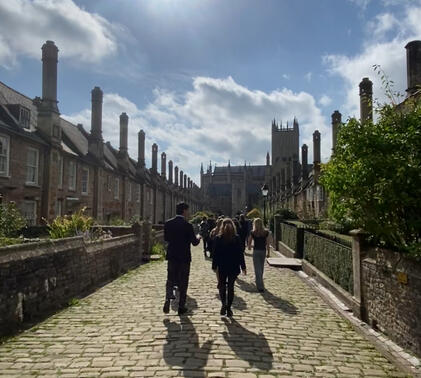
By Isaac and Sophia, Head Students
As Head students, we had the privilege of representing Sidcot at the annual Heads’ Conference hosted by Wells Cathedral School. The event brought together head students from independent schools across the South West, with some travelling for up to two hours from as far away as Cornwall. It was a rare and valuable opportunity to meet peers who share the same role and responsibilities, and to openly discuss what leadership looks like in our schools; both the successes we are proud of and the challenges we face.
The day began with a welcome talk on the qualities that define strong leadership. We were encouraged to reflect on the idea that good leaders are those who set the tone for others. One metaphor that stuck with many of us was that a leader is like a single fish brave enough to leap into another tank, showing others that it is possible to follow. As Head Students, we are now in the spotlight, and younger students will look up to us. This reminds us of Mr Jones’ own phrase: “Be the example, not the exception", highlighting how leadership is less about giving orders and more about demonstrating through action the standards, values, and courage you want others to adopt.
After the introduction, we split into three larger groups for a rotation of workshops. Each session addressed a different aspect of leadership, providing us with the opportunity to learn not only in theory but also through practical experience.
My group began with a session led by a teacher with military leadership experience. We were introduced to models such as the “suggest-request-demand” approach, which means beginning with collaborative discussion but also recognising when more direct, decisive leadership is required. This balance between flexibility and firmness is something that resonated strongly with us, especially as we often find ourselves navigating between being approachable peers and being figures of responsibility. It was eye-opening to see leadership broken down into clear, adaptable strategies rather than vague traits.
The second workshop was drama-based and explored communication, presentation, and presence. We often think of leadership as being about decision-making, but this session highlighted how much of it is about how you present yourself. Through interactive activities, we focused on maintaining eye contact, using body language effectively, and developing vocal confidence. These may sound simple, but they are the foundations of whether people listen to you and take your leadership seriously. It was particularly useful to be reminded that confidence can be practised and built, rather than being something you either naturally have or don’t. This workshop provided us with tools that we could immediately apply in assemblies, meetings, or even casual interactions where people look to us for guidance.
The final workshop of the day took us outside for team-building challenges. The activities, ranging from “diffusing bombs” to crossing “rivers” and climbing through hoops, pushed us to work together under pressure. What made the exercises even more powerful was that each group had a designated leader who had been assigned a hidden role to play, such as being overly critical, refusing to adapt, or being enthusiastic but unhelpful. The rest of the group had to navigate not only the task itself but also the impact of these leadership traits on their performance. It was fascinating to see how quickly negative behaviours could frustrate and demotivate a team, while positive leadership traits boosted morale and efficiency. This practical demonstration was a striking reminder that leadership isn’t neutral- the way we choose to act as leaders has a very real effect on those we are working with.
Reflecting on the day, what stood out most was the chance to connect with other Head Students. Sharing experiences across different schools gave us reassurance that many of the struggles we face, from managing workload to encouraging peer participation, are not unique to us. At the same time, hearing about what works well in other schools gave us new ideas and inspiration to bring back to Sidcot. For example, some schools had creative ways of balancing leadership responsibilities with academics, while others had strong systems for gathering student voice. These conversations were just as valuable as the formal workshops, as they reminded us that leadership is not something we carry alone, but part of a wider network of student leaders across the region.
Overall, the conference was an inspiring and thought-provoking experience. It not only developed our practical skills but also deepened our understanding of what it truly means to lead - to listen, to adapt, to model, and to influence. We left Wells Cathedral School with new friendships, a stronger sense of confidence in our role, and ideas we are eager to explore within our own school community. Above all, the day reinforced that leadership is less about titles and more about the responsibility of setting an example that others can trust and follow.


